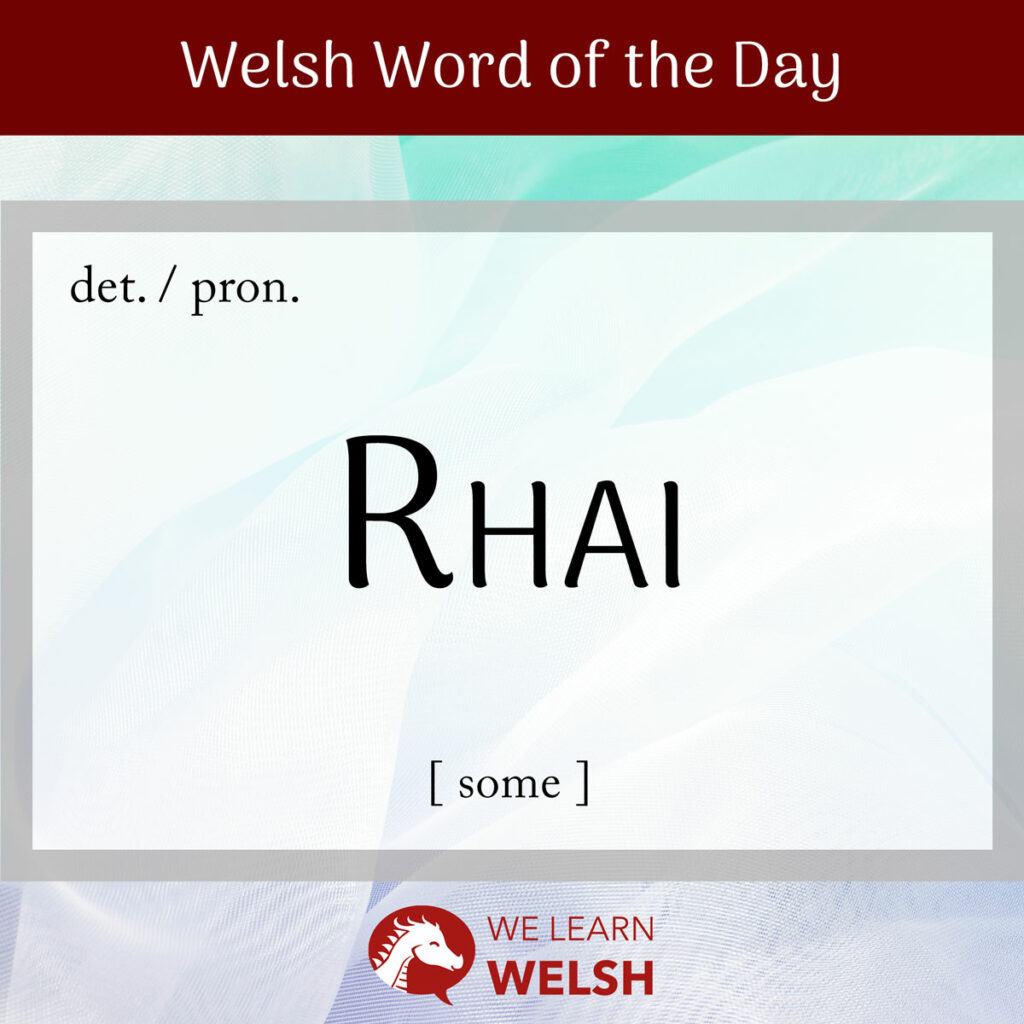Today’s Welsh word of the day is rhai, an incredibly useful determiner and pronoun. It’s best translated as some.
rhai
some
Rhai can only mutate in one way, becoming rai.
Soft mutation
rai
Nasal mutation
N/A
Aspirate mutation
N/A
But there are a lot of cases where this can happen, so it’s worth being aware of. For example, the very important phrase mae gen i (I have) causes a soft mutation, meaning I have some is mae gen i rai.
It’s often hard for learners to pronounce the rh noise, so you might find that you often say rai when you mean rhai regardless! To get the right rh sound, try to breathe out while you enunciate the initial r. It’s okay if it sounds a bit like ruh–huh or huh-ruh at first.
There are three main ways in which rhai is used. Firstly, it can mean a non-specific number of. For example, rhai cathod means some cats. Note that rhai requires you to use the plural form of a noun, while counting nouns in Welsh with a specific number requires the singular form (e.g. naw cath = nine cats).
Secondly, it’s sometimes used without a following noun, so instead of translating as some, it’s semantically more like some people or some things. We do use some like this in English as well – take the simple phrase some say. We’d say this in Welsh, too: mae rhai’n dweud.
Another example of this usage is the expression braf ar rai. This literally means fine on some, and it’s a translation of it’s all right for some. Or, it could come up in a question, like pa rai? (which ones?)
Lastly, but similarly to the first two uses, rhai is often employed where the English equivalent would be ones. For example, the big ones is y rhai mawr. Here it’s been qualified with the word y (the).
We can also qualify it with possessive pronouns, as in dy rai di (your ones) or ei rhai hi (her ones). These are particularly useful because in Welsh we don’t have a specific word for mine as in my ones. In English, we say you can share mine, but in Welsh, you need to say the full galli di rhannu (fy) rhai fi, literally you can share my ones.
Ie, dw i’n gwybod, ond dw i eisiau (fy) rhai fy hun.
Yeah, I know, but I want my own.
There are quite a few related terms which are used in similar, but subtly different ways. Rhyw also means some, but in a more general than numerical sense. For example, the compound words rhywle and rhywun mean someplace and someone respectively.
It works in phrases too; the phrase some other way is rhyw ffordd arall and some guy would be rhyw ddyn. (Note that rhyw is causing a soft mutation here!)
Then there are the forms rhain and rheina. These are directly derived from rhai itself – coming from the combination of rhai with hyn (this / these) and yna (there). Rhain means these or these ones, and rheina means those.
Some people say rheini or rheiny instead of rheina. The meaning and usage is exactly the same, but these are just slightly more formal alternatives. They come from combining rhai with hynny instead of yna.
There are even more ways to combine rhai with other words. For instance, y rhai acw (those ones over there) and y rhai yma (these ones here) are both commonly used expressions.
In some parts of Wales, they may be abbreviated or ‘smushed together’ when people are talking – for example, y rhai acw could easily become rheicw or rheico – but they’ll almost always be expressed as two separate words in writing, unlike the more standard rhain and rheina.
Bydd rhai o‘i deulu’n cael pryd llysieuol.
Some of his family will have a vegetarian meal.
The word ambell isn’t etymologically related to rhai, but it is relevant, because they are used in very similar (sometimes even the same) grammatical contexts. Ambell is an adjective meaning occasional or a few. Unlike most adjectives, it happens before the noun. It sometimes appears in the form ambell un (a few ones), which functions very similarly to rhai.
Take the phrase there are some others. Here you could choose between mae rhai eraill and mae ambell un arall. The only difference is that arall has become its plural form in the first example, because rhai is a plural pronoun.
Another one could be some children. Either rhai plant or ambell blentyn is fine. You just need to use a plural noun after rhai and a singular with ambell.
Most people would say that ambell conveys a less significant amount than rhai does. But this is neither universal nor that important – remembering the plural / singular rule for usage is the key thing, and then you can have your pick of which to use!


